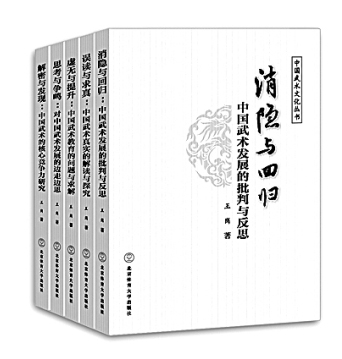Martial arts: Product of the culture of harmony

Chinese Martial Arts Culture Series
Human activities are cultural activities that can humanize nature. Human history can also be seen as a cultural history of humanizing nature. Elaborating on this culture of humanizing nature is a persistent theme in the Chinese martial arts according to Wang Gang, a professor from Wuhan Sports University.
For Professor Wang, in terms of vertical historical development, Chinese martial arts are entirely synchronous with Chinese culture—they both originate from deep reflections on war. This is how “archery”—winning the heart of the people through an attitude of not enthusiastically and ambitiously fighting for success—came into being. This archery (one of the six arts a virtuous person should master) was first advocated by the people of the Zhou Dynasty who, after defeating the tyrant Emperor Zhou of the previous Shang Dynasty, put the weapons into storehouses and set the horses free on the Southern Mountain, demonstrating their desire for peace. Similarly, in The Art of War by Sun Tzu in the Warring States period, Master Sun states that the most superior of all good ways to win is to subdue the enemy without fighting. This is one of the most well-known doctrines of Chinese military thought.
From a theoretical perspective, Chinese martial arts are also in amazing alignment with Chinese culture. In Chinese culture there is a saying that “one is not able to set foot in this world without studying rites and etiquettes.” Similarly, the culture of Chinese martial arts states that “one should learn rites and etiquette before he learns any kinds of arts.” Chinese culture advocates honoring the king and being respectful to powerful lords, while Chinese martial arts also considers it a taboo to use one’s strength to bully the weak or to aggressively seeking fights and value force. Chinese culture advocates retreating for the sake of advancing, as well as conquering the unyielding with the yielding. Martial arts also advocates such ideas as following the dominance of the opponent and accomplishing a great task with little effort by clever maneuvers.
Considering all this, Wang concludes that the Chinese martial arts are a product of the culture of harmony. They pursues results, but value more the process. They advocate training the body, but still don’t consider it an honor to defeat the opponent. They stress skills as well as driving forces. All these correspond to various principles of Chinese culture.
Chinese martial arts stress more the virtues rather than the logic of winning, and martial artists cannot be called masters unless they are virtuous and master great martial arts. Without understanding this, it would be difficult for us to understand what Sun Tzu said in The Art of War, that “virtue is the deep foundation of military forces.”
(edited by CHEN ALONG)
